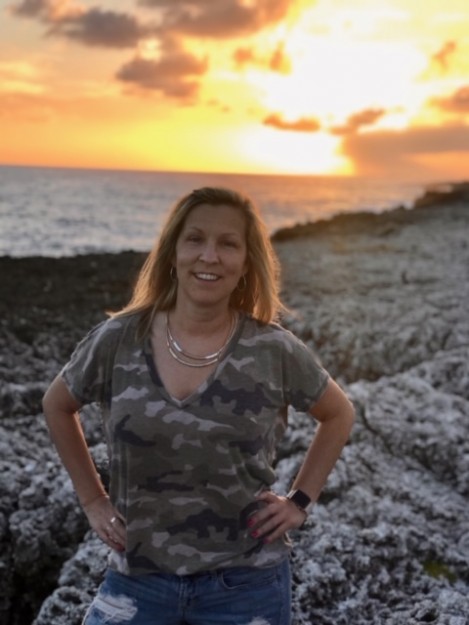“If you looked at me, you would have no idea I have cancer,” acknowledges Maikki Nekton, a 37-year-old social worker and self-described workaholic with piercing blue eyes and a smile that lights up her whole face.
If you didn’t know Maikki, you’d be even more shocked to find out that she’s been given a loose survival timeframe of one to three years. Creeping up on the one-year mark, Maikki says she now finds herself wondering if she’ll reach, or even surpass, the three-year mark. She also wonders what to focus on right now. But there is something she is unequivocally clear about that, at the beginning of her cancer journey, she wasn’t.
“Now I realize that I’m a survivor. Even though I have Stage IV cancer,” Maikki observes. In the oncology world, she explains, a patient with cancer is considered a survivor from the time of diagnosis. Initially, she didn’t accept that definition, believing she could only claim the label if she were cancer free. Now, she understand differently.
“It is a battle. And you are a survivor,” she says.
While every stage of survivorship has its own unique set of challenges, Maikki now finds herself confronting a complicated crossroads that is becoming increasingly common among survivors with metastatic cancer: how to find some semblance of balance between work, pleasure, and cancer therapy amid an uncertain future. It’s a situation she never expected to confront five years ago.
The avid runner and seemingly healthy young woman woke one day in the spring of 2014 to bruises all over her legs and incredible itchiness. She was diagnosed with primary sclerosing cholangitis, or PSC, similar to cirrhosis of the liver but in the bile duct and cured only by a liver transplant. Her best friend generously stepped up to donate hers (individuals can donate a portion of their liver, whose cells regenerate upon transplantation). That was the easy part.
PSC predisposed Maikki to developing cholangiocarcinoma, a rare and aggressive type of cancer otherwise known as bile duct cancer. Her diagnosis came within months of learning she had PSC. Before Maikki could undergo a liver transplant, she endured a three-week regimen of chemotherapy coupled with simultaneous radiation and followed by a treatment called brachytherapy in which a radioactive source is placed directly onto the tumor the tumor. The transplant was a success. But treatment wasn’t over yet.
Doctors recommended that Maikki resume chemotherapy four months after recovering from her liver transplant, since just before the surgery one of her lymph nodes had tested positive for cancer. The new round of infusion chemotherapy, which would last six months and, doctors hoped, kill off any lingering cancer cells, would take place at Johns Hopkins under the care of Dr. Ana Maria Cristina De Jesus-Acosta.
Given what she’d already endured, Maikki didn’t think twice about it. “I was still able to work thirty hours a week during the chemotherapy,” Maikki says. She credits that in large part to her doctor’s sensitivity to balancing her quality of life with the intensity of treatment. “Dr. De Jesus has always been good about knowing what to ask, and what to tweak [with regard to chemotherapy]. I think oncologists are really concerned that you find a balance between better treatment and quality of life,” Maikki observes.
The additional, post-operative chemotherapy rendered Maikki cancer-free in 2015. But in September of 2018, bothersome low back pain made her suspicious. A CT scan showed that her cancer had recurred in her bone, and behind her pancreas. Soon after learning that she had advanced metastatic cancer, Maikki immediately returned to fight mode, starting a different form of chemotherapy.
For now, Maikki continues to work full-time as a manager at the Living Legacy Foundation, an organ procurement organization. It’s work she feels she was meant to do. “It allows me to give back to a community that really gave to me,” she says.
Clearly not one to give in to defeat or self-pity, Maikki reflects in her typical optimistic fashion on some of the moments at Johns Hopkins that have made her cancer journey more bearable; inspiring, even. She mentions Jesse, an employee at the Skip Viragh Outpatient Cancer Center whose primary job is to greet and check in patients; she calls “amazing.” She mentions nurses, the chaplain, and social workers with whom she’s come in contact, all of whom she says are there “for the right reasons.” She talks about the Sidney Kimmel Comprehensive Cancer Center’s free patient-centered events—the Surviving Survivorship Conference and Cancer Survivors Day—that she’s attended; she has even volunteered as a model in the latter’s fashion show.
“People say: ‘I don’t know how you do it.’ But you just find this inner motivation,” Maikki says. “I’m not going to let this take me down until I have to.”

What an indomitable spirit Maikki has shown through every stage of survivorship. Thanks for sharing with everyone- truly inspiring!
Determined inspiration and living life to its fullness!!
Comments are closed.